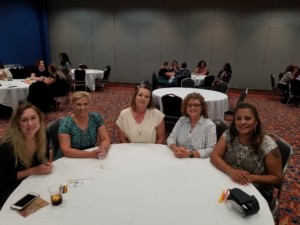PRAIRIE VIEW, Texas (October 22, 2021) – Training specialists in PVAMU’s College of Juvenile Justice typically help adults who work with students ages 12-17 as part of the Texas Juvenile Crime Prevention Center’s focus on preventing adolescent delinquency. They say having mental health issues is often a precursor to adolescent crime. So, they often train a variety of professionals, from probation officers to teachers, law enforcement, attorneys and nurses.
Until recently, this group has never been a part of a massive training of middle and high school teachers — a city’s worth. They volunteered with what is known as a “YMHFA Blast” — Youth Mental Health First Aid Training, in this case, organized by the San Antonio Independent School District, in partnership with the Center for Healthcare Services, a nonprofit community resource.
In one day, they joined scores of other trainers and trainers-in-training to bring the basics of mental health first aid to nearly 900 San Antonio teachers.
“YMHFA training is sort of like CPR training, but it’s for youth who are presenting with mental health conditions,” the PVAMU reps said. “The training helps you learn how to be a first responder.”
The Mental Health First Aid concept was created in 2001 by Betty Kitchener, a nurse specializing in health education, and Anthony Jorm, a mental health literacy professor (the two run Mental Health First Aid Australia). From there, the program was adapted by other similar nonprofits, such as Mental Health First Aid USA and the National Council for Mental Wellbeing (the latter has “trained more than 2.5 million people in the U.S. to identify, understand and respond to signs and symptoms of mental health and substance use challenges,” according to its website).
The event took place at 30 schools around the city, with each training helmed by a pair of certified training specialists. The intensive eight hours saw teachers separated into groups of five and given information on potential mental health problems — how to recognize the signs and symptoms and how to respond appropriately. In some cases, teachers role-played in pairs using scripts, prompting discussions; afterward, teachers were tested.
Participants were taught the fundamentals of ALGEE, the original five-step mental health first aid action plan. Using ALGEE (a mnemonic), one:
- Assesses for risk of suicide or harm
- Listens non-judgmentally
- Gives reassurance and information
- Encourages appropriate professional help, and
- Encourages self-help and other support strategies
Those familiar with ALGEE say it’s not a linear acronym; rather, it’s whatever you need at the time. Participants are taught what it’s like to have good and poor listening skills. Self-support could be anything from yoga to meditation to just talking to somebody. And you help them connect to a counselor or a medical doctor, and if it’s a crisis situation, they learn how to contact 911, what to do when 911 is there, and how to deal with a suicide situation.
“I’d say it built on what I already knew,” said PVAMU Training Specialist Rebecca Ramirez-Barnes, who spent the day as an observer. “The experience was really positive because it was good to see that information shared with individuals who may not be completely aware of the signs of mental health issues that teenagers could be exhibiting. I really enjoyed seeing that message spread.”
Participants also learned about suicide awareness, symptoms of substance use, symptoms of psychosis, symptoms of eating disorders, and what they should do in each of those situations. “You learn how to recognize potential mental health problems, how you decide whether or not it’s a crisis, and you’re given a toolbox of how to respond to those problems,” PVAMU’s training specialists said.
-PVAMU-

